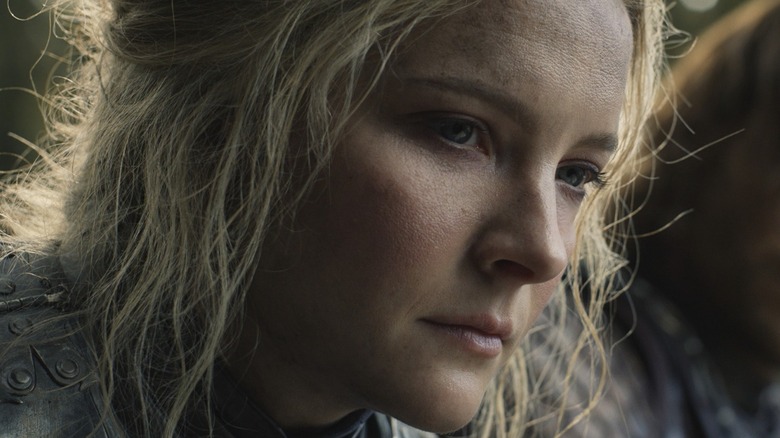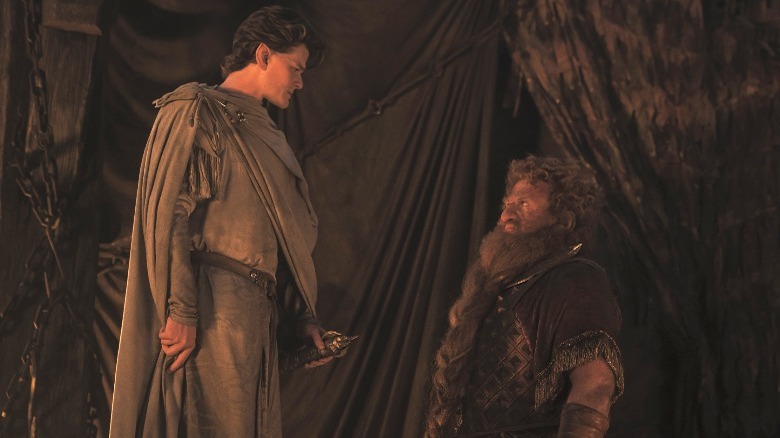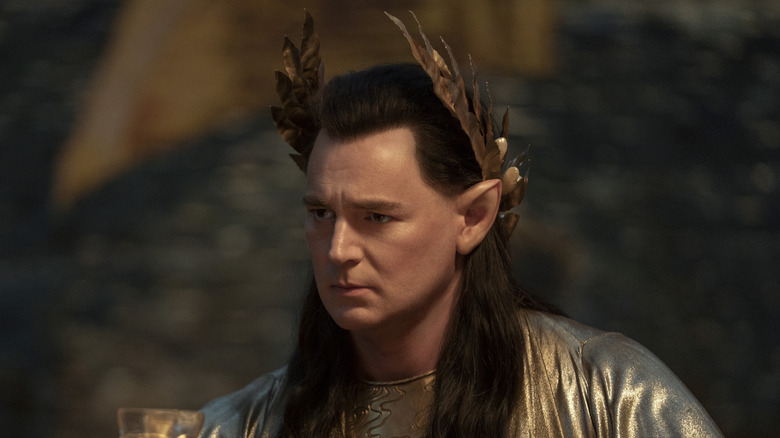The Rings Of Power Episode 5 Adds Crucial Context To Middle-Earth's Classic Beef
Contains spoilers for "The Lord of the Rings: The Rings of Power" Season 1, Episode 5
For a world and history built on alliances and fellowships, there sure is a lot of tension between the races of Middle-earth. Whether you've picked up J.R.R. Tolkien's epic page-turner or seen Peter Jackson's adaptations, it's common knowledge who stays out of whose way in this realm of misty mountains and ancient forests. Some do it for fear of confrontation, whereas others do it because they don't trust another race for past events and insults. Now, in this week's installment of Amazon's "The Lord of the Rings: The Rings of Power," we're seeing part of the history of just such a feud that rages on in the Third Age.
Admittedly, friction is building in areas thanks to the growing threat of Sauron and any other dark forces hoping to take over the land. Even so, two advocates from opposing races keep to their word and stay as tight as best buds would: Elven Vice-Regent Elrond (Robert Aramayo) and Dwarven cave-dweller Prince Durin IV (Owain Arthur). Regardless of their tense reunion at the start of the season, these two are looking out for one another, sealing (seemingly) unbreakable oaths and making up for lost time. However, it's with the growing tests of this friendship that we're starting to get the first glimpse of a major feud in Middle-earth that is beginning to feel totally warranted in the grand scheme of things.
The divide between Dwarves and Elves is beginning to manifest on The Rings of Power
This week, it's made clear that both Durin and Elrond have been kept in the dark as to why their recent catch-up even came to pass. Elrond apologizes to his friend, revealing that both Gil-galad (Benjamin Walker) and Celebrimbor (Charles Edwards) knew about the Dwarves' mining activity and hope to go halfsies on their discovery. While it feels understandable, then, for Durin to fire back at his friend, when he's told the reason for the Elf-lord's visit, it forces the Dwarf prince to decide to help save his recent hosts' future. If they don't unite, the Elves are at risk of vanishing from existence, and Durin is happy to help stop that from happening.
Such a noble act does clash with the common conception regarding Dwarves outside of "The Rings of Power." As Elrond himself says to Gandalf in "The Fellowship of the Ring" before the meeting in Rivendell, "The Dwarves? They hide in their mountains seeking riches. They care nothing for the troubles of others." It's a massive contrast to the kindly king in the making and the Elf-lord who says it, suggesting that we're reaching the point as to why their views changed so drastically. It also puts the Elves in a different light than we've seen before, making the Dwarves' distancing themselves completely understandable.
The Rings of Power proves Elves aren't as clear-cut as we've believed
Just as the Dwarves were perceived as the grumpy, grudge-bearing mountain dwellers before "The Rings of Power," so were the Elves presented as the elegant and observant higher beings of Middle-earth who seemingly know what's best — that is, until we saw Gil-galad looking down on a cliffside at what feels like a plan coming to fruition. Elrond's king, while stoic and fair as he may have been upon his meeting with Durin, feels like he's hiding something far worse. His actions scream manipulation and secrecy that could add even more insult to injury when the Dwarves find out.
Even when the secret is spilled, neither Celebrimbor nor Gil-galad seems to be showing all his cards in the long game they've begun. It's not what we'd expect from two significant players in Middle-earth who are set on changing it in a major way. For now, we can only wait and see what the fallout will look like in the future of "The Rings of Power," but trusting an Elf might be worth adding to the list of things Dwarves will come to regret.


